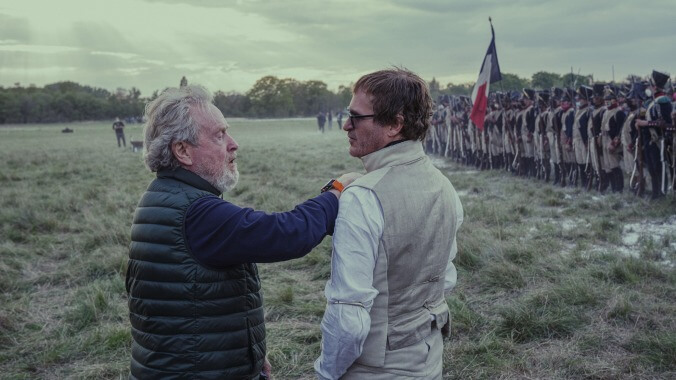Ridley Scott on Napoleon complaints from French critics: “the French don’t even like themselves”
Whoa, the British guy doesn't care if French critics like his movie about a famous French guy

Earlier this month, as part of a New Yorker profile, Napoleon director Ridley Scott suggested that anyone pointing out historical inaccuracies in his film should “get a life” (which seems fair, if bluntly stated, because that kind of very-online anti-fun/creativity “criticism” is exhausting and pretentious, and Scott shouldn’t feel obligated to engage with it), but Scott went a little harder in a recent chat with the BBC when specifically asked about French critics having issues with his movie about the famous French bastard.
French GQ, for example, apparently called the film “deeply clumsy, unnatural, and unintentionally funny, French newspaper Le Figaro comparing its versions of Napoleon and Josephine to Ken and Barbie, and Napoleon biographer Patrice Gueniffey calling it “very anti-French and very pro-British. Scott, who of course is British, shrugged off comments like that in typical Ridley Scott-style, arguing that, “the French don’t even like themselves.”
Funny, yes, but he also noted that when he screened the film for an audience in Paris “they loved it,” so this is apparently one of those “it’s not for the critics, it’s for the fans” movies, provided the critics are French people and the fans are French people who… perhaps take themselves less seriously? Either way, this all feels like a silly extension of the eternal feud between the British and the French, so maybe some French filmmaker should make a movie about an iconic-yet-problematic British historical figure, and everyone in the movie can just speak French and not even attempt English. Then someone can ask Ridley Scott about it and he’ll be like “I don’t care, shut up.”
Elsewhere in the chat, Scott weighs in on “movies are too long” discourse by saying that he made a conscious decision to keep Napoleon under three hours. He cites the “bum ache factor” from sitting too long and also the “Christ, we can’t eat for another hour” realization that people have, both of which he tried to avoid by making the film a brisk 150 minutes or so—at least until the director’s cut hits Apple TV+ at some point. “We’re not allowed to talk about,” he notes.